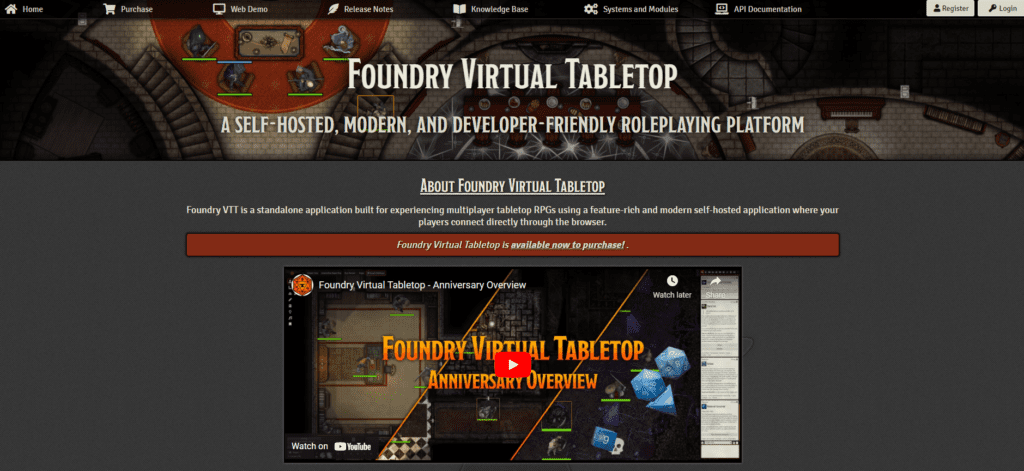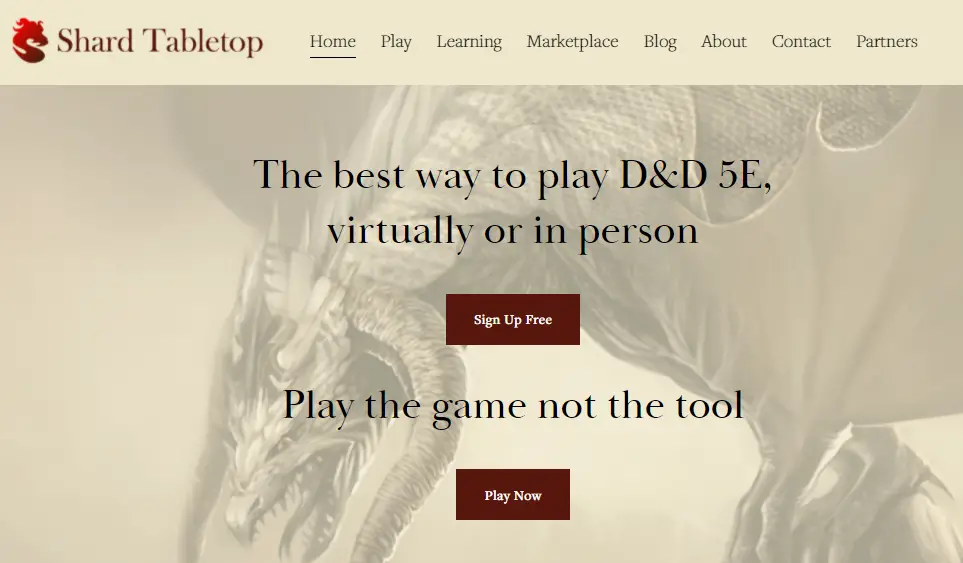If you want to be an online Dungeon Master to run a game of Dungeons & Dragons these days, you need to ask: What is a D&D Virtual Tabletop? Thanks to COVID, and increasingly online socialization in general, D&D has gone online in a big way. Your tabletop is moving. So you might as well embrace the brave new world of VTTs.
What is a VTT? – Virtual Tabletop
A virtual tabletop (VTT) is an online application that allows you to play traditionally in-person TTRPGS (tabletop role-playing games) with other players through an online interface. Groups can be from any location (as long as they have a stable internet connection) and can log in at any time. D&D is the classic TTRPG, and it can be played online very successfully.

Why Online D&D is Awesome
Obviously, there are pros and cons to playing D&D online. But for someone who is not a firmly committed “in-person” player, there are an awful lot of good things about online D&D. Some are perhaps unexpected but are still a pleasant surprise. Here’s a brief rundown:
- It’s faster and easier
- It’s available virtually anytime, anywhere – making finding people to fit the time you need is MUCH easier
- You don’t have to haul a bunch of shit around with you
- You can meet and play with people from all over the world
- Technology allows for you to see your players and have a surprisingly “real” feeling in-person social gaming experience
- You can pop in and out of “one shots” easily but just hopping on a few sites and quickly joining a game
Yes. You are gonna get those that say “online D&D is just not the same as playing around a real table. That is completely true. It is not the same. But it can still be very fun, if you do it right.

VTTs have this covered, no problem.
Image Courtesy CraftyDM
Why should you use VTTs for D&D?
D&D is about creating a story – collaboratively. People/friends come together and work together, with their DM, to tell their story. Obviously, to work together, you have to be together. And yes, you can be together online. VTTs allow players from any location to connect online and play D&D with their friends without being in the same room. But they also allow strangers to become friends while playing. That is the both challenge and the joy.
The Best D&D VTTs
Unfortunately, there is no right or wrong answer to “Which is the best VTT?” It all depends on your preferences, your skills and the kind of game you want to present. Presented below are five good options, each offering something different. They are presented in order of “popularity of use” but that really doesn’t mean anything. In fact, there is a gem in here that doesn’t get a lot of attention, but it is actually an excellent option for online D&D.
This is not an exhaustive list. There are plenty more options for those looking to play D&D with remotely. Furthermore, this article is not meant to endorse any platform. However, it will give you a good idea where you might want to start and what might work best for your own, personal DM style.

Roll20
Roll20 is currently the most-used VTT for D&D. It’s been around for a long time, and many DMs first learned how to run games online with Roll20. Some have stuck with the platform, others have left for one reason or another. But all-in-all, it is good, tried, and well-known VTTs for dungeon lovers.
Roll20 provides a digital tabletop that lets players play together online with their character sheets and dice. In addition, the game can be played with video and voice chat if you want to see your fellow players’ reactions on camera. There’s also an option to turn off the video and play in a text-only environment.
Although the free version of Roll20 is more than enough to get started playing, its paid subscription offers more features, like higher resolution maps and more storage space for your campaigns.
WOTC Stuff
Roll20’s especially big draw is that you can purchase all the official Wizards of the Coasts (WOTC) modules directly and get started with a well-known module right away. This is a HUGE plus. It’s probably the main reason so many people stick with Roll20. When you buy a published module (for example, Curse of Strahd) on Roll20, you get all the maps, assets, player handouts, and pre-made characters you would need to get started playing faster.
Of course, there are many more publishing company modules available besides WOTC. Roll20 also offers many modules for other TTRPGs (not just D&D 5e), which is a huge deal for many.
Fantasy Grounds
Fantasy Grounds, which was created before Roll20, features a sophisticated platform that supports a wide range of gaming systems and comes with a lot more out of the box than seems at first look. There are several time-saving features, such as automation and a superb implementation for whichever system you’re playing and random tables for DMs. However, because it is paid software, at least one member in your “organization” must pay a fairly hefty licensing fee, or everyone must pay the $39 license fee. There is also a monthly subscription fee.
It did receive a major overhaul in 2020 with its “Unity” release. It the ability to automate so much stuff that makes Fantasy Grounds so attractive to many DMs. And, yes, all of the WOTCH rulebooks and adventure modules are available for purchase. Again, this is huge deal for many DMs who love their D&D. DMs can spend hours perfecting their D&D campaigns, automating so many things and making it all look awesome. Those who are used to “old school” D&D might find it quite surprising (and perhaps a little bit “video game-like.” But it sure is cool.

Foundry – VTT for D&D
Foundry, one of the market’s newest VTTs, only emerged from closed beta in 2021. However, despite being under testing for several years, it has swiftly attracted many loyal gamers. It’s the sort of thing that DMs will either LOVE for all its “fancy stuff,” or they will steer away from because it is fairly complicated to sort out. Compared to Roll20, it seems much more sophisticated. It is lovely to look at and play inside of. It is designed to be a powerful tool with an intuitive interface and various advanced features. It provides a wide range of add-ons to help you enhance or customize gameplay.
Foundry differs from Roll20 and Fantasy Ground in a couple of important ways. First of all, there are no subscriptions. You buy a software license for a one-time fee, and you have access to all of its features … forever! All the lighting and sound features, all the community-created plug-ins, all the game systems, the ability to create custom compendiums, everything – up to and including the ability to build plug-ins and game systems yourself, should you be so inclined.
The base software is also self-hosted – meaning it runs on one’s own PC. DMs will need to have a relatively fast and stable internet connection, for both themselves and their players. There are also some option for external hosting. Obviously, you are going to need to know some “hosting” stuff to be able to run it but there is a lot of help available out there.

Shard Tabletop – D&D VTT
Shard Tabletop is the “gem” hidden in here. It is new, designed by D&D lovers for D&D and is a joy to use in terms of “user-friendliness.” Its design was clearly a labor of love, and it is continually being improved. One of the co-founders, Hal Howard, is a long-time dungeon delver and has massive amounts of programing knowledge on his side. Shard is easy to learn as a DM, has exactly what one would want and nothing one doesn’t, and is extremely easy for players to use.
However, there is one drawback. You can’t buy WOTC adventures or sourcebooks from Shard. You have to “self-reproduce” all the WOTC stuff. Which is not hard to do, but it does take some time (providing you do have a legal version of any given module). For those who just want to get cracking at a WOTC module asap, Shard may not be the best choice. But, if you are not married to the official WOTC, Shard is really quite a joy.
There is a free version of Shard, but it is rather limited for DMs. However, the full “Master Pro” subscription package is very reasonable. You can take your hardcopy (or electronic) modules and quite easily add what you want – creating your own specially tailored modules. They do also have lots of other (non-WOTC adventure and sourcebooks) available. They have numerous, outstanding content “partners.” But if you gonna have WOTC stuff available right way (while having to pay for it, of course), Shard is probably not a good option.
Homebrewers
If you are DM that writes/creates your own stuff, you really should look into Shard. DMs can easily create maps, add art assets, and write their own “books” to their hearts’ content. Shard does also have a good stock of character options (many exactly like WOTC Players Handbook options). If you homebrew your D&D, check out Shard.
Final Thoughts on VTTs for D&D
The greatest challenge for virtual tabletops is not having a physical form of the game that allows for a live-action feel. But you would be surprised just how far designers have come. The current options for VTTs are pretty darn good. But you should take a careful look at what is out there before you fork over any cash. Each VTT has its strengths and weaknesses. As VTTs can be a tempting place to spend a lot of money, you owe it to yourself to take a good look around before making a firm commitment.
Just realize running a game of D&D online is totally do-able. There are so many people out there right now just waiting for you to schedule a game. All you need to do is pick a VTT and roll for initiative!





This is a good article, VTTs and online gameplay have come so far in just a few short years and I think the Pandemic just Expanded the options exponentially. It takes a lot less than people really think to run a D&D game online. If you are already internet savvy and even if you are not there are so many resources out there too, If you really want to there is a growing positive community of willing and helpful players…
Thanks for your comment! I did do some in-person one shots and it was a PAIN to have to worry about hauling everything out .. books, maps, tokens, etc. I thought online was actually a lot easier lol